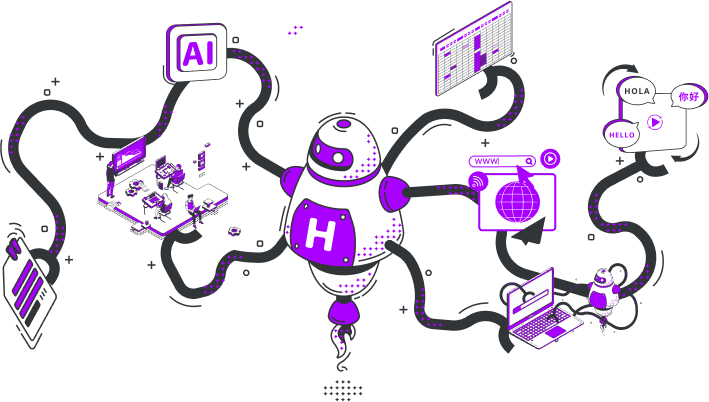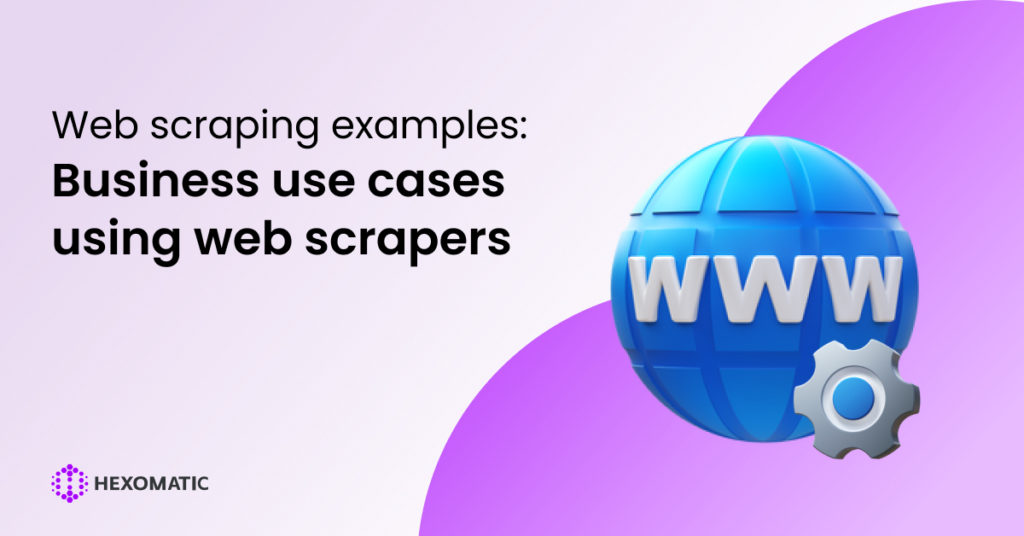The world’s information be it images, video, text, numbers, or any other data is stored on the internet. Having the data is crucial for any business in the modern world.
However, businesses and individuals lack access to most data or accessing large amounts of data within time or budget constraints is too stressful and time-consuming.
Here is where web scraping software comes into play. But what is web scraping?
Web scraping has numerous uses in the modern world. Regardless of the company or individual, collecting data has its own specific requirements and applications.
We will discuss a variety of business use cases for web scraping software in this article and how anyone can tap into this goldmine of data using no-code web scraping tools.
Read on to get all the insights you need to begin your web scraping adventure.
What is Web Scraping and How Does It Work?
But what is web scraping and how does it work? Web scraping (also known as web data extraction, or web data mining) is the automated method of gathering structured data from the web.
Almost everyone has copied and pasted data from websites. Unlike the mundane process of manual copy-pasting, web scraping applies intelligent automation for retrieving a ton of data points from the web. This is way faster and more comfortable.
Data scraping is used by individuals and businesses who want to make better decisions by utilizing publicly available web data.
In short, the popularity of web scraping isn’t surprising: it provides STRUCTURED data from any public web source. The main power of data scraping is building and powering businesses worldwide.
Business Use Cases for Web Scraping
There are a number of targets for web scraping, depending on the type of information to be collected, the format, and which industry the information should be applied.
One thing is common: data is essential for any business that wants to make smarter decisions and move forward rapidly. As the evidence of importance you can look through the amount of open data analyst vacancies and see that those specialist are highly demanded.
Below, we will talk about the most common business use cases for web scraping and how they are connected to one another.
1. Lead Generation
Every sale and every business begins with lead generation. Leads are people who are interested in your services or products. The formula is simple: the more leads, the more sales, and the more income.
Recent studies show that over 90% of marketers admit that lead generation is their most critical goal. However, high-quality leads are one of their pain points, which, often, makes the process of lead generation a struggle.
Fortunately, web scraping can help you kick-start the lead generation process on a new level. Our advice is from defining your target audience based on whether you are a B2B or a B2C business. After that, you can get to work on finding your leads by scurrying Yelp, Google Maps, Amazon, etc.
Learn more about scraping Yelp to find leads.
2. Market Research
Your most important source of information while starting a new business or promoting your existing business is market research. Contract management plays a crucial role in this process, ensuring that you establish strong business relationships and safeguard your interests.
Here, the formula is simpler: the more data, the more possibilities to have a high-quality and high-insightful basis for your research and development goals. By conducting thorough market research, especially when you are starting a business, you gain valuable insights that can lead to successful outcomes.
3. Product and Price Monitoring
Web scraping is commonly used by entrepreneurs to research their competitors’ products and prices. In order to ensure their business growth and successful market positioning, they need to keep a watchful eye on this type of data constantly.
For example, regular price scraping allows finding out and analyzing the changes that happened amidst a certain time period; as well as monitoring the latest product and price trends among competitors, partners, or supply and distribution channels. Consequently, this helps to adjust the company’s pricing strategy and demand planning quickly and effectively.
Studies reveal that price monitoring helps to outperform over 74% of competitors.
Hence, our recommendation is to conduct constant product and price monitoring assuring the quality of the scraped data to stay a step ahead of the competition.
4. e-Commerce Data Monitoring
Any kind of data scraped from e-Commerce platforms and marketplaces is considered e-Commerce data.
In practice, scraping data from e-Commerce platforms like eBay or Amazon is not as straightforward as it may seem due to anti-scraping mechanisms, dynamic platform changes, cloaking, etc.
Learn more about scraping eCommerce website data.
5. Real-estate Data Monitoring
Big data has changed the face of almost any industry, and real estate is no exception.
To pursue a data-driven strategy, increase customer satisfaction, or multiply earnings, real estate agencies need to scrape real-time data from platforms with a large pool of information about real-estate prices, specific properties and consumers, the economical situation of different areas, public records, and more.
For example, web data scraped from property listings, real estate agencies’ websites, and public records can be used for identifying areas in high demand, making predictions on market developments, insurance ranges, etc.
Likewise, scraping reviews and rankings from real-estate listing websites can be useful for determining the most valuable features for a specific property as well as relationships with property owners or brokers.
As a result of the scraped data, homeowners and agents can improve their marketing and ad campaigns in order to meet the current customer needs and expectations.
Learn how to scrape a real-estate listing website.
6. News Monitoring
Media coverage has become an essential part of any organization’s reputation in the modern world, especially for companies that frequently appear in the news headlines.
In the span of a single news cycle, media is capable of creating outstanding value for your company or an existential threat.
Here, the ultimate solution is again scraping large amounts of data and performing sentiment analysis of its basis.
Performing sentiment analysis on the base of the scraped data is the ultimate solution in this case.
Learn how to scrape Google news.
7. Hospital/Clinic Data Analysis
Healthcare companies can also make use of web scraping to provide customers with balanced solutions, be ahead of competitors, and so on.
The Healthcare industry generates a variety of data, including records of health insurance, laws, regulations, and research results. This information can be utilized to create significant insights.
According to Oracle’s latest report, the healthcare industry will soon have access to 50 petabytes of data. This data can be utilized by hospitals or other healthcare institutions for a variety of purposes, including public health analysis, drug pricing, disease monitoring, maintaining insurance databases, and more.
8. Financial Data Monitoring
By leveraging web scraping as a strategic value, it is possible to make more data-driven financial and investment decisions and assess risks and opportunities using different information sources.
In the modern world, the finance sector heavily depends on web scraping to evaluate its investment strategies. Web scraping helps to analyze current market conditions, uncover market changes, calculate possible risks, and monitor local and global news for stock market insights.
Learn how to leverage Google news and run Sentiment analysis for stock market decisions.
Closing words
In this article, we looked through different industries and areas that have the potential to benefit from web scraping to grow more successful, profitable, and performant businesses.
Our main goal is to help and guide you and business owners in making informed decisions based on facts and data that you can easily extract using Hexomatic.
Automate & scale time-consuming tasks like never before

Marketing Specialist | Content Writer
Experienced in SaaS content writing, helps customers to automate time-consuming tasks and solve complex scraping cases with step-by-step tutorials and in depth-articles.
Follow me on Linkedin for more SaaS content
